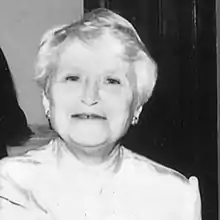Sara Anderson Immerwahr
Sara Anderson Immerwahr (August 28, 1914 in Royersford, Pennsylvania – June 25, 2008 in Chapel Hill, North Carolina) was an American Classical archaeologist.[1][2]
Sara Anderson Immerwahr | |
|---|---|
 | |
| Born | August 28, 1914 |
| Died | June 25, 2008 (aged 93) |
| Nationality | American |
| Occupation(s) | Archaeologist and art historian |
| Spouse | Henry Rudolph Immerwahr |
| Academic background | |
| Education | Mount Holyoke College |
| Alma mater | Bryn Mawr College |
| Thesis | The Mycenaean Pictorial Style of Vase Painting in the Thirteenth Century B.C. (1943) |
| Academic work | |
| Discipline | Classical archaeology |
| Institutions | The University of North Carolina at Chapel Hill |
Life
Immerwahr earned her bachelor's degree from Mount Holyoke College in 1935. One of her tutors at Mount Holyoke was archaeologist Caroline Morris Galt.[3] She gained her Ph.D. from Bryn Mawr College in 1943 with a dissertation entitled "The Mycenaean Pictorial Style of Vase Painting in the Thirteenth Century B.C."[4]
She was married to Henry Rudolph Immerwahr from 1944 until her death. She served as faculty member in both classics and art history at the University of North Carolina at Chapel Hill.[5]
In 2021 the American School of Classical Studies at Athens named a suite after her and her husband.[6]
Scholarship
- 1990. Aegean painting in the Bronze Age. University Park: Pennsylvania State University Press.
- 2004. Sara Anderson Immerwahr and Anne Proctor Chapin. Charis: essays in honor of Sara A. Immerwahr. Princeton NJ: American School of Classical Studies at Athens.
Students
- 1972. Gesell, Geraldine C. The Archaeological Evidence for the Minoan House Cult and its Survival in Iron Age Crete. Ph.D., Department of Classics, University of North Carolina at Chapel Hill.
- 1974. Cross, Toni Marie. Bronze Tripods and Related Stands in the Eastern Mediterranean from the Twelfth Through Seventh Centuries BC. Ph.D., Department of Classics, University of North Carolina at Chapel Hill.
- 1975. Mattusch, Carol C. Casting Techniques of Greek Bronze Sculpture: Foundries and Foundry Remains from the Athenian Agora with Reference to Other Ancient Sources. Ph.D., Department of Classics, University of North Carolina at Chapel Hill.
- 1981. Haskell, Halford W. The Coarse Ware Stirrup Jars of Crete and the Cyclades. Ph.D., Department of Classics, University of North Carolina at Chapel Hill.
- 1981. Sutton, Robert F. The Interaction Between Men and Women Portrayed on Attic Red-figure Pottery. Ph.D., Department of Classics, University of North Carolina at Chapel Hill.
References
- "Sally Anderson Immerwahr (1914-2008)". www.ascsa.edu.gr. The American School of Classical Studies at Athens. June 30, 2008.
- Richard F. Liebhart. "Biography of Sara A. Immerwahr." Hesperia Supplements Vol. 33, ΧΑΡΙΣ: Essays in Honor of Sara A. Immerwahr (2004), pp. XIII-XVI https://www.jstor.org/stable/1354058
- Liebhart, Richard F. (2004). "Biography of Sara A. Immerwahr". Hesperia Supplements. 33: XIII–XVI. ISSN 1064-1173. JSTOR 1354058.
- "Sara Immerwahr - Department of Classics - The University of North Carolina at Chapel Hill". classics.unc.edu. Retrieved 22 January 2018.
- Richard F. Liebhart. "Biography of Sara A. Immerwahr." Hesperia Supplements Vol. 33, ΧΑΡΙΣ: Essays in Honor of Sara A. Immerwahr (2004), pp. XIII-XVI https://www.jstor.org/stable/1354058
- "Friends Name Henry R. and Sara A. Immerwahr Suite in New Student Center | American School of Classical Studies at Athens". www.ascsa.edu.gr. Retrieved 2022-05-01.